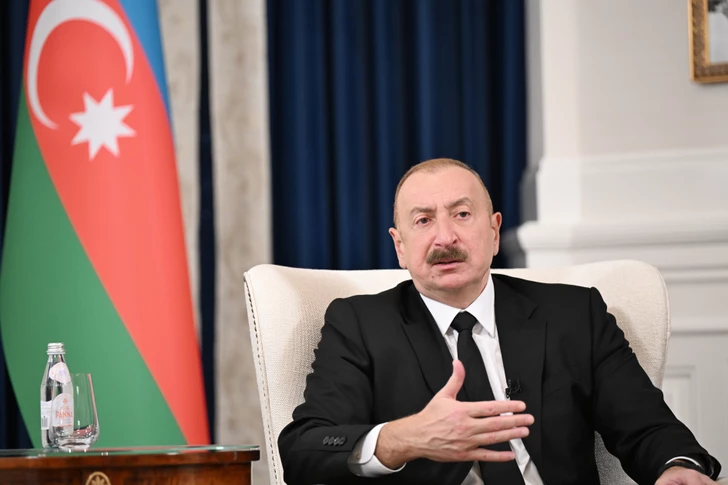August 9, 2025 | Washington
President Ilham Aliyev has hailed his working visit to Washington, at the invitation of U.S. President Donald Trump, as the start of a “new chapter of cooperation and strategic partnership” between Azerbaijan and the United States. Speaking to Azerbaijani media, Aliyev described the meeting with Trump as “warm, friendly and results-oriented”, highlighting both the signing of a Memorandum of Understanding to create a Strategic Working Group for a U.S.–Azerbaijan Strategic Partnership Charter and the repeal of Section 907 of the Freedom Support Act.
Aliyev said the Strategic Charter will outline future cooperation in mutual investment, energy, transport, transit, security, artificial intelligence, and defense industry. He stressed the urgency of moving forward after what he called “four lost years” under the Biden administration, when relations “froze” and became hostage to the Armenia–Azerbaijan conflict.
On the repeal of Section 907 — a U.S. congressional amendment that restricted aid to Azerbaijan since 1992 — Aliyev called it a “symbolic act of justice”, noting that while Azerbaijan no longer needs foreign aid, the decision sends a powerful political message.
The president also underscored the historic importance of the peace agreement initialed with Armenian Prime Minister Nikol Pashinyan in the White House, in the presence of Trump. He said the agreement, along with a joint request to the OSCE to dissolve the Minsk Group, removes key obstacles to a final peace treaty.
Aliyev emphasized that constitutional changes in Armenia to remove territorial claims against Azerbaijan are essential for the treaty’s signing, calling such changes “a matter of respect, above all, for the United States.”
Responding to concerns in some U.S. media about Christian communities in Karabakh, Aliyev described Azerbaijan as a center of multiculturalism where ethnic and religious groups live “like one family.” He dismissed long-standing anti-Azerbaijani narratives as the work of the Armenian lobby and former U.S. officials hostile to Baku.
On regional connectivity, Aliyev reiterated the importance of an unimpeded land link between mainland Azerbaijan and Nakhchivan — a commitment Armenia undertook in 2020 — and announced that the U.S. will manage the planned “Trump Route for International Peace and Prosperity” (TRIPP). He said the corridor would strengthen Azerbaijan’s role as a transit hub, bring economic benefits to Armenia, and open opportunities for the entire region.
Aliyev also pointed to the Exxon–SOCAR cooperation memorandum as a step toward a potentially major oil discovery, and said energy — including oil, gas, and renewables — will remain a key pillar of U.S.–Azerbaijan ties. He noted that Azerbaijani natural gas already supplies 14 countries, including 10 NATO members, and that Baku is expanding exports into the Middle East.
“Today we are witnessing a truly historic day for security, stability, peace, economic opportunity, investment, and energy security in the South Caucasus,” Aliyev concluded. “We must not waste time — if the peace agreement is initialed, its signing should not be delayed.”


